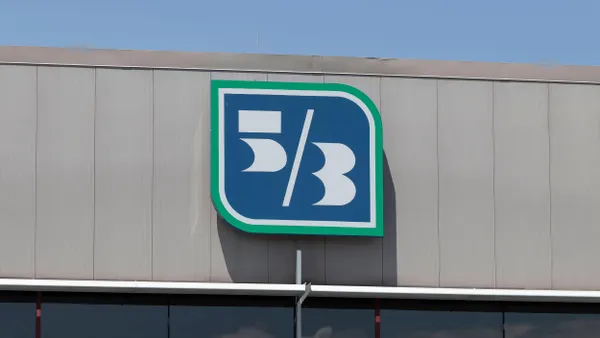Dive Brief:
- Eleven states and Puerto Rico are investigating a group of 11 "payroll advance" companies over allegations some are skirting usury laws by disguising exorbitant interest rates as "tips." "We will use all the tools at our disposal, including partnering with peer regulators to safeguard consumers from predatory lending and scams that ensnare families in endless cycles of debt," New York Department of Financial Services (NYDFS) Superintendent Linda Lacewell said in a press release Tuesday.
- Payroll advance companies differ from payday lenders in that, for a fee, they let workers access income they've already earned but haven't received because of delays in the pay cycle. Differences among these companies' business models prompted the investigation. Payroll advance companies typically offer money at a significantly lower interest rate than payday lenders, the latter of which are illegal in 15 states.
- The multistate investigation appears to stem from NYDFS's subpoena in March of one of the companies, Earnin. The New York Post published a story detailing a user's experience with the app, which led to numerous overdraft fees and a supposedly optional tip that amounted to a 469% annual percentage rate (APR).
Dive Insight:
At issue is the way payroll advance companies offer services to employees. Employers such as Walmart, Kroger, Taco Bell and Boston Market have partnered with companies to offer payroll advances to workers as a benefit, according to Bloomberg Law. In such cases, the third-party provider fronts the money and then recoups it from the user's next paycheck or through a bank account debit on payday.
Other companies, such as Earnin, offer their services directly to the worker and take back the advanced money on a set date from the user's bank account. The company doesn't charge fees or interest, but users "may make voluntary additional payments in appreciation of the services rendered," according to the app's website. The tips can range up to 14% on a $100 advance (which equates to 730% APR, or 30 times New York state's 25% cap). However, users who don't tip appear to have their credit restricted, according to American Banker.
"This is a brand new model, so we expect and welcome questions from regulators like the New York Department of Financial Services," Earnin said in a statement about the investigation. In a twist, Earnin CEO Ram Palaniappan in April hired Ben Lawsky, who ran NYDFS until 2015, to help the company respond to the agency, according to the New York Post.
Regulators from Connecticut, Illinois, Maryland, New Jersey, North Carolina, North Dakota, Oklahoma, South Carolina, South Dakota and Texas are joining in the investigation. But they aren't the only states paying attention to payroll advances.
California's state Senate in May passed a bill that would limit early pay transactions to three per pay period and 50% of a worker's unpaid earnings and cap related fees at $14 per month.
Pay advocates said speeding up the pay cycle won't address deeper issues such as wage stagnation and lack of savings that are, perhaps, pressing some employees to use advances. A Federal Reserve study in May found that nearly 40% of Americans don't have $400 in their bank accounts.
Out of 2.2 million Walmart employees worldwide, some 350,000 use payroll advance provider Even's app to manage their finances or get paid ahead of schedule, said Michelle Malashock, a company spokeswoman. The retailer also partners with a second provider, PayActiv, which is among the 11 companies NYDFS is investigating. PayActiv, which is based in San Jose, California, has backed the California bill.














